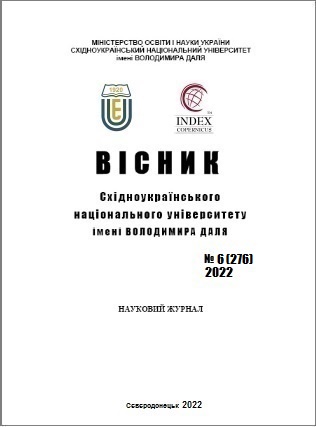Economic policy of regulation of the digitization process
DOI:
https://doi.org/10.33216/1998-7927-2022-276-6-20-25Keywords:
digitalization, economic policy, regulation, digital technologies, management strategiesAbstract
The development of a digital world, where the growth of individual and collective activities is recorded, foresees digitization for future technological improvement, creates unique opportunities to increase social and environmental well-being and further improve global living standards, preserving and improving the health of the environment for future generations. While the growth of the digital economy can increase productivity and benefit local and global economies, digitalization also creates potential sustainability challenges related to social (disruptive effects of digital technologies due to the impact of social networks on lifestyles) and environmental well-being (management of natural resources and care for future generations) thanks to the automation of information processing and service provision. Digitization should therefore be managed, but national governments remain divided on a single strategy to promote sustainable digitalization for the development of the present without compromising the needs of future generations (i.e. social and environmental well-being). Regardless of the state's response to digital governance and how it is shaped by political and institutional realities, adaptive approaches to governance are necessary to address the economic and social sustainability challenges associated with various manifestations of digitalization. The speed of progress, increasing scale and complexity of digital systems pose challenges for government and industry to promote sustainable digital growth and development, particularly in relation to responsible consumption and production: big data, artificial intelligence and distributed transactions and information sharing through technology. The aim of the article is to consider different digitalization management strategies that can be used to overcome the new challenges caused by technologies such as artificial intelligence, digital technologies and big data. Regardless of the governance strategy adopted by a particular government, a sustainable digital economy will inherently require flexible and adaptive governance approaches that allow stakeholders in industry, government and society at large to iteratively adjust their best practices and codes of conduct to reap the benefits of digitization without unnecessary or unacceptable risks or losses. In general, adaptive governance requires collaboration between industry, academia and non-governmental institutions to monitor digital services and identify threats related to digitalisation.
References
1. Гриньова В. М., Власенко В. В. Організаційні проблеми інноваційної діяльності на підприємстві: монографія. Харків: ВД «ІНЖЕК». 2005. 200 с.
2. Клюс Ю.І. Організаційно-інформаційне формування корпоративного управління інноваціями. Глобальні та національні проблеми економіки. 2015. № 6. URL: http://global-national.in.ua/issue-6
3. Козловський В. О. Інноваційний менеджмент: навч. посіб. Вінниця: ВНТУ. 2007. 210 с.
4. Пєтухова О. М. Формування системи управління інноваційною діяльністю підприємств. Наук. праці Нац. ун-ту харч. технологій. 2012. № 43. С. 174–180.
5. Bundesministerium für Wirtschaft und Energie (BMWi). G20 – Shaping Digitalization at Global Level; Organisation for Economic Co-Operation and Development: Paris, France, 2017. URL: https://www. de.digital/DIGITAL/Redaktion/EN/Dossier/g20-shaping-digitalisation-at-global-level.html.
6. De Croo A. Why Digital Is Key to Sustainable Growth; World Economic Forum: Cologny, Switzerland, 2015. URL : https://www.weforum.org/agenda/2015/03/why-digital-is-key-to-sustainable-growth/.
7. Estevez E., Janowski T., Dzhusupova Z. Electronic governance for sustainable development: How EGOV solutions contribute to SD goals? In Proceedings of the 14th Annual International Conference on Digital Government Research (Quebec City, QC, Canada, 17–20 June 2013). ACM: New York, NY, USA, 2013. Pp. 92–101.
8. Evangelista R., Guerrieri P., Meliciani V. The economic impact of digital technologies in Europe. Econ. Innov. New Technol. 2014. № 23. Рр. 802–824.
9. Hodgson C. Can the Digital Revolution by Environmentally Sustainable? The Guardian: London, UK, 2015. URL : https://www.theguardian.com/global/blog/2015/nov/13/digital-revolution-environmental-sustainable.
10. Irfan U. (2017). Bitcoin’s Price Spike Is Driving an Extraordinary Surge in Energy Use. Vox Media: New York, NY, USA. URL : https://www.vox.com/energy-and-environment/2017/12/2/16724786/bitcoin-mining-energy-electricity.
11. Kshetri N. The emerging role of Big Data in key development issues: Opportunities, challenges, and concerns. Big Data Soc. 2014. № 1.
12. Kuhlman T., Farrington J. What is sustainability? Sustainability. 2010. № 2. Рр. 3436–3448.
13. Organization for Economic Co-Operation and Development (OECD). Key Issues for Digital Transformation in the G20. Report Prepared for a Joint G20 German Presidency/OECD Conference 2017a. URL : https://www.oecd.org/g20/key-issues-for-digital-transformation-in-the-g20.pdf.
14. Organization for Economic Co-Operation and Development (OECD). Secretary-General’s Report to Ministers 2017. OECD Publishing: Paris, France, 2017.
15. World Commission on Environment and Development (WCED). Our Common Future; Oxford University Press: New York, NY, USA, 1987.

